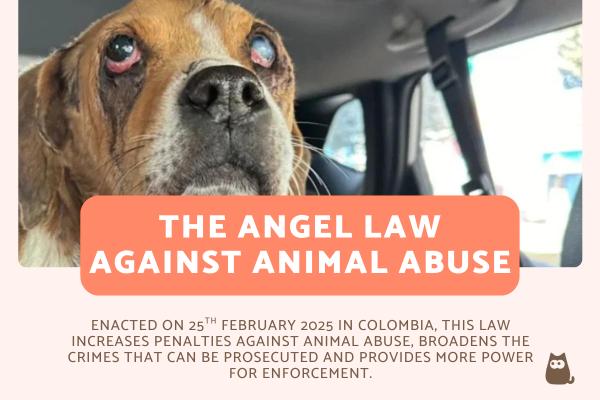The Angel Law - How Colombia is Fighting Animal Abuse


Animal abuse is an ongoing problem across the world, but not all countries are dealing with it in the same way. Too many countries have insufficient animal rights legislation or enforcement, resulting in wild, domestic and livestock animals being without protection. Fortunately, some countries are taking a stand and addressing the problem on a governmental level. This is the case with Colombia which recently passed the Angel Law against animal abuse. Social pressure led to this initiative which toughens penalties for crimes of animal abuse. AnimalWised explains what is the Angel Law and how Colombia is fighting animal abuse, as well as the circumstances which led to its enaction.
What is the Angel Law?
The Ley Ángel (translation: ‘Angel Law’) is a legislative act unanimously approved by the Colombian government on 25th February 2025. The aim of the legislation is the combating of animal abuse and cruelty. In doing so, it recognizes them as sentient beings. To achieve this aim, it improves and complements the current regulatory framework.
The Angel Law project emerged thanks to social pressure following a serious case of abuse involving a dog named Ángel. This is the reason for the name of the legislation. Ángel died in February 2025, four years after he suffered a brutal attack in October 2021. This attack attempted to skin Ángel alive as an act of revenge against his owner's family.
The brutal attack left him Ángel with injuries across 80% of his body. Although he survived, he was left with permanent damage and pain which followed him for the remainder of his life. Ángel's story led to a community-led movement to prevent this kind of abuse and provide justice for animals in similar situations.
Specifically, the Angel Law sets out a few key objectives:
- Justice for animal abuse: its basic objective is to strengthen the fight against animal abuse, firmly supporting the investigation and punishment of these behaviors. Doing so provides greater protection of animals. Although various complaints of animal abuse have been filed, only a tiny percentage resulted in convictions. This proves the need to improve legal ramifications so that no case of animal abuse goes unpunished.
- Prevention of animal abuse: the law also focuses on preventing animal abuse and raising public awareness about this evil practice. It is considered a historic law for animal protection in Colombia and a good example of the importance of animals in society. It shows the importance they have as part of homes and families. The law reaffirms a social commitment to animal welfare and, consequently, to building a more just society.
It should be noted that Ángel was attacked by an identified man seeking revenge on his previous caregivers. Ángel managed to survive thanks to the care of the Mi Mejor Amigo protection organization, despite suffering injuries to 80% of his body. His attacker was not convicted due to lack of evidence, although the case has since been reopened.
If you think you know of an animal experiencing cruelty, take a look at our article on the signs of an abused dog.
What does the Angel Law say?
One of the most important aspects of the Angel Law is that it has update legislature to toughen the penalties currently enforced against animal abusers. Specifically, it allows for swift prosecution and punishment of cases of animal abuse that do not constitute a crime.
Furthermore, the Angel Law increases the penalties for mistreatment, injuries (serious and minor), death and sexual abuse against animals. These penalties are both financial and criminal. It has also created additional penalties for aggravating and being an accessory to animal abuse.
Criminal penalties
- Serious injuries: this can incur a prison sentence of 20-40 months.
- Intentional killing: if an animal is killed intentionally, the prison sentence can range from 32-56 months.
- Aggravating circumstances: these include acts of extreme cruelty and sexual abuse against the animal, incurring a minimum jail time of 48 months.
Financial penalties
- Serious injuries: 15-30 times the monthly wage of the perpetrator.
- Killing of the animal: whether intentional killing or death as a result of injuries, the fine can be 30-60 times the monthly wage.
In addition to criminal and financial penalties, the Angel Law legislation increases enforcement powers. Police powers to rescue animals or carry out disciplinary procedures have also been increased. Officers will be able to enter homes when they suspect animal abuse is occurring to the point of endangering its life.
Furthermore, the Angel Law seeks prevention by prohibiting those convicted of animal abuse from living with animals again for a minimum of 5-7 years. They also establish mandatory educational measures for judges, prosecutors and police inspectors, improving their awareness and attention to cases of animal abuse. This means they will know how to handle them appropriately. The new law also penalizes animal abandonment.
These are the first steps toward generating change in Colombian society toward greater awareness of animal rights. In the rest of the world, see how the five freedoms of animal welfare can help us know how animals need to be treated.
Other important changes due to the Angel Law
In addition to the main changes we have mentioned, the Angel Law also includes other important legislative powers. They include the following:
- It creates the so-called ‘Animal Abuse Care Route’, specifically geared toward ensuring enforcement officer know how to handle these types of cases in all municipalities.
- Aggravating factors considered include vicarious violence against an animal such as mutilation, as well as distributing material with animal pornography or scenes of animal violence.
- Among the additional penalties created by this law, such as the aforementioned prohibition on owning animals, is also disqualification from practicing animal-related professions. The goal is to prevent these individuals from reoffending.
- Another new development is the creation of a registry of convicted individuals, managed by the Prosecutor's Office and the police. This can greatly facilitate convictions for abuse is the creation of forensic technical guides for veterinarians so they know how to prepare expert reports that can be used as evidence. It's worth remembering that Ángel's attacker was not convicted precisely due to a lack of evidence.
- Cases of minor abuse may be punished by attending an animal protection course.
If you know an animal that has suffered, you may find our guide to helping an abused dog feel calm and trust again helpful.
If you want to read similar articles to The Angel Law - How Colombia is Fighting Animal Abuse, we recommend you visit our What you need to know category.





